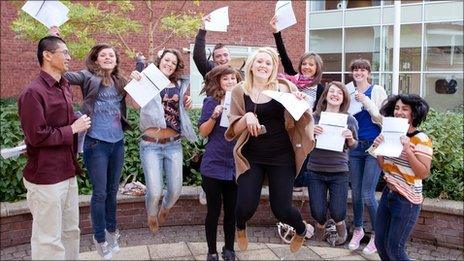Wales A-levels: Minister defends exam performance
- Published
The education minister said he does not accept A-Level performance in Wales was worse than in the rest of the UK.
There was a fall in the percentage of top grade Wales A-level results, the lowest since 2006.
But Leighton Andrews said the whole picture must be examined, with a record number gaining the Welsh Baccalaureate advanced diploma - equivalent to an A-grade.
Students with A*s fell from 6.5% to 6.3%.
The proportion with A grades fell from 24.4% last year to 23.9%.
He also stressed overall results were up, with an increase in A* to Cs.
Teachers say a "sober assessment" of the fall in top grades is needed.
The percentage of entries gaining A grades is now at its lowest level in Wales since 2006.
Mr Andrews was asked a number of times about this by BBC Wales.
He said: "This is a great day for students in Wales.
"The results are up overall, we've got more young people doing well, we've got an increase in the grades A* to C.
"We are very pleased fewer young people are leaving school without qualifications.
"This is a day to celebrate the success and hard work of students, teachers and the support they've had from their parents."
In a separate interview with BBC Wales education correspondent Ciaran Jenkins, Mr Andrews said: "We've got a record number of young people who have achieved the advanced diploma in the Welsh Baccalaureate which for university entry of course is the equivalent of an A-grade at A level and that's what's important.
The Welsh Bac is an alternative recognised qualification. Students must still pass at least two A-levels to obtain it, but they also take part in work-related education and voluntary work, and academic studies including politics and languages.
Mr Andrews said: "I think we've got to look at the whole picture in Wales - we've got an increase in overall performance, we've got an increase in the A* to C grades and we've got that record number of people who have got the equivalent of an A grade at A level through getting the welsh Baccalaureate."

Students at Yale College in Wrexham celebrate their A-level results
Mr Andrews said that "the reality is we've got an additional 7,000 young people who've got the equivalent of an A grade at A-level because they got the advanced diploma in the Welsh Baccalaureate and that's not included in the A-level figures."
Dr Philip Dixon, director of ATL Cymru, said Thursday should be a day to celebrate results.
But he added: "In time we will need to make a measured and sober assessment as to why the numbers gaining top grades has fallen slightly."
Gareth Pierce, chief executive of the WJEC, said one possible explanation for the drop in top grades was the increase in the number of boys taking A-level exams.
"The boys performance is not as strong as girls so I think there is a connection there," he said.
"The question for Wales is whether we are giving enough support for boys attainment post 16.
"There are plenty of initiatives lower down in schools but I think its an important message for Wales to continue that support well beyond aged 16 as well."
As students opened their results those who did not make the grade faced a fight for a university place.
Applications are up dramatically in all but two of Wales' 10 universities, but the number of places is likely to remain roughly the same as last year.
A new Welsh Government cap means universities face fines if they recruit above their quotas.
Those who miss out may still land a place through the clearing system with all universities except Aberystwyth expected to have some spare places.
There will be competition this year, though, from English, Scottish and Northern Irish applicants aiming to avoid increases in tuition fees in Welsh universities due to be introduced next year.
Greg Walker, deputy director of Higher Education Wales, told BBC Radio Wales: "Almost all universities in Wales will have some clearing places available today.
The BBC's Colette Hume joined some students as they found out how they had done
"Some will actually have more clearing places than last year - there are some where that's not the case.
"There will be some disappointed students - those students with good grades that have not managed their [university selection] will have an opportunity to apply again and I would encourage them to think about that."
NUS Wales president, Luke Young, said it was disappointing that top grades had dropped in Wales.
"This is something for which answers will be called for, but this should not take away the achievement of the many students who celebrate their success today.
"It is important to remember that more people in Wales gained A-Levels overall compared to last year."
Eleri Jones, head teacher of Ysgol Brynhyfryd in Ruthin in Denbighshire, said: "There's such competition for places for medicine and veterinary surgery but we also find courses such as physiotherapy very, very competitive.
"Because the applications are made prior to the results then sometimes students are not offered places, but when their results come and they reapply they are able to secure a place for the following year."
Despite achieving four A*s and the Welsh Baccalaureate, Susie Gregory does not have a place at university.
She said: "I want to do veterinary medicine. There's not many places for that so I'm going to take a year out and apply next year."
- Published18 August 2011
- Published19 August 2011
- Published19 August 2010
- Published20 August 2010